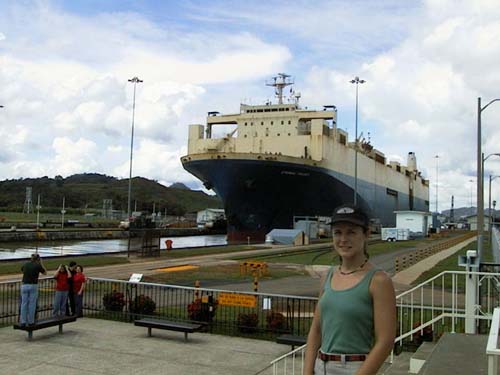
Peace Corps volunteers get acclimated in Panama
Peace Corps volunteers get acclimated
by Eric Jackson
A group of 14 new Peace Corps volunteers recently finished their initial training in Capira district's commuity of El Cacao, where some of them got their first lessons in Spanish, most of them got their first exposure to the tropical climate and all of them learned about rural poverty and its challenges. For 12 weeks the volunteers, mostly recent graduates of US universities, took classes in the morning and worked in the afternoons. On April 7 they will be sworn in at a ceremony at the US ambassador's residence and dispatched to impoverished rural communities, mostly in the Ngobe-Bugle Comarca, to work on a new environmental health project.
The volunteers will mostly be making, demonstrating and teaching the construction and use of composting outdoor toilets. These inexpensive privies recycle wastes onto fields and orchards rather than contaminating groundwater and degrading fishing streams with them.
John Spaulding, a native of Sterling, Massachusetts and graduate of Warren Wilson College in North Carolina, explained the construction and maintenance of the new toilet in an El Cacao family's back yard. "They are extremely easy to make. Total costs are about $300," he explained, adding that two or three people can make one by working a few hours over two or three days.
Mike Gaffney, who grew up in Rhode Island but lived in California after graduating from Connecticut College, explained the process by which human waste is turned into fertilizer, and recommended "The Humanure Handbook," written by Joseph Jenkins and distributed by Chelsea Green Publications in White River Junction, Vermont as the best guidebook. He admitted that the concept of a composting toilet seems disgusting or at least a bit weird to many who hear of it for the first time, but added that "when they see the project in a year or so, they'll be more interested."
Ryan Gross, an Omaha, Nebraska native who went to Iowa State, compared the requirements of traditional privies with those of the composting variety. One of the great advantages of the latter is location --- sewage from the old-style outhouses seeps out into the surrounding soil to a much greater extent than from the facilities that the Peace Corps is promoting, and thus for health reasons the traditional varieties must be located farther from wells and streams.
The volunteers will all be working on a public health program with agricultural implications, but they come from a wide variety of academic backgrounds. Megan Day, who grew up in Washington and studied anthropology at Central Washington University, will of necessity need to learn another culture when she starts working in El Tigre Abajo, Veraguas, and on top of that she's learning what it's like to live in the tropics for the first time (and has yet to experience the joys and miseries of Panama's rainy season).
April Snitker, who's from Chicago and a University of Illinois graduate, will be working closer to her field when it comes time to use the fertilizer, as she comes to the Peace Corps after working at the Chicago Botanical Garden. A keen observer of the Byzantine ways of Chicago politics and the social and urban planning consequences thereof, she's about to gain some experience in growing international friendships at the grass roots level.
In most cases the new volunteers will be on their own as the only Americans in their assigned communities, intentionally living at a standard that doesn't set them too far apart from their new neighbors. Though they will be working without a lot of direct supervision, their work will be directed by a more senior volunteer, upstate New York native Reed Palmer, who has extended his service with the Peace Corps for a year after serving in the Darien community of Aguas Frias. That two-year assignment to one of Panama's most humid areas was the University of Virginia grad's first exposure to the tropics, and he's back for more. Palmer, who says that his reception by Panamanians has been overwhelmingly friendly, will relocate to the destitute Chiriqui district of San Felix for his new job.
